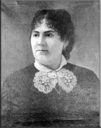

Hakes Family Tree
Person Chart
Parents
| Father | Date of Birth | Mother | Date of Birth |
|---|---|---|---|
 Jose Joaquin Armenta Jose Joaquin Armenta |
17 Jun 1775 |  Maria Hilaria Avila Maria Hilaria Avila |
1789 |
Partners
| Partner | Date of Birth | Children |
|---|---|---|
 Jose Antonio De La Cruz Bermudez Jose Antonio De La Cruz Bermudez |
1773 |  Maria Del Refugio Bermudes Maria Del Refugio Bermudes |
Person Events
| Event Type | Date | Place | Description |
|---|---|---|---|
 Birth Birth |
13 Jun 1806 | Mission San Gabriel Arcángel, Alta California, New Spain | |
 Christening Christening |
15 Jun 1806 | Mission San Gabriel Arcángel, Alta California, New Spain | |
 Marriage Marriage |
12 Aug 1823 | Mission San Gabriel Arcángel, Alta California, New Spain | |
 Death Death |
Facts
| Fact | Description |
|---|---|
| Ethnic Origin | Native Chumash |
Notes
| From City of San Bernardino website: A woman of great force and ability, the enterprising Maria Armenta Bermudez opened the first store in the San Bernardino Valley. When the names of prominent pioneers in San Bernardino County's early history are mentioned, well-known personalities like Antonio Lugo, Jefferson Hunt and William F. Holcomb are frequently brought up. On the other hand, unless you're a local history aficionado, the name of Maria Armenta Bermudez probably won't ring a bell. It was while the Lugo family was in the process of securing ownership of the Rancho San Bernardino in 1839 that this little known pioneer started making her mark in our county's annuals. At the initial headquarters for the Lugo clan (on the site of today's County Courthouse), Maria and her husband, Jose, took on the role of overseers for their good friends, who were spending a majority of time with their land holdings in the Los Angeles area. The Bermudez family's close ties with the Lugos started when Jose's young brother married a cousin of Don Antonio Lugo. By 1836, the Bermudez family, which consisted of several children, were living on Lugo's Rancho San Antonio. When the whole gang moved to the San Bernardino Valley a few years later, Jose Bermudez was often credited with helping the Lugos out. And in an era when the male population's accomplishments greatly overshadowed their female counterparts, this certainly was common practice. However, since he was over 70 and not in good physical shape, it was Maria who really took charge. Thirty years younger than her husband, she was the one who truly ran the show. A woman of great force and ability, the enterprising Maria Armenta Bermudez opened the first store in the valley adjacent to the adobe headquarters. And until 1842, when the Rancho San Bernardino was officially granted to the Lugos, the Bermudez clan made their home at the mouth of Reservoir Canyon, thus becoming the first to own property in what is now the Redlands area. There, Maria took charge of planting extensive vineyards while tapping into the Zanja (a circa 1820s irrigation ditch) for water. So well respected was she that the water source was often referred to as the "Maria Armenta Ditch." When the Lugos were given title to the rancho in 1842, Maria and her elderly husband move to the nearby San Timoteo Canyon area, sometimes called "Canada de Dona Maria Armenta". It was there that this unusual woman, described by one writer as "a sort of Amazon", cultivated large fields of corn and grain. She carried her produce to Los Angeles by two-wheeled "carretas" and oxen from San Bernardino to San Gabriel. In fact, it was due to her brawn and hard work that the primitive pack trail that Maria followed was gradually transformed into a road more suitable to wagon traffic. On Dec. 10, 1847, the energetic pioneer woman applied for ownership of some land near the Los Angeles River, now that her 79 year-old husband was obviously unfit for strenuous labor. Considering that she was frequently passing through the area with her oxen and carts in order to earn a living for her family, Maria needed a commodious place for a corral. Without much question, the petition was granted. Unfortunately, Maria Armenta Bermudez's final years were not well documented. Her granddaughter, Lucy Bermudez Stillsbury, told local historian Edith Parker Hinkley around 1950 that one day her grandmother jumped across a ditch and accidentally ran a stick into her foot, which resulted in fatal lockjaw. Thus an ignominious, tragic end came to a most remarkable woman. |
| 1519 - 1804, "Las Californias" was under the "Viceroyalty of New Spain"; The southern part of the territory was referred to, at times, as "Vieja California" (Old California), the northern part "Nueva California" (New California). The terms "Old" and "New" stem from the physical locations of the first Missions, Presidios and Pueblos… 1804-1822, the Spanish Crown created two new governments in Las Californias, the Southern Peninsula (Baja California), and the Northern Mainland (Alta California)… 1810 Mexico declared independence, with the Mexican War of Independence following for over a decade. In 1821 Treaty of Córdoba established Mexican independence from Spain and concluded the War… 1822-1846 Alta California was under Mexican control… 1846, Alta California passed to American control after the Mexican–American War and ceased to exist with the creation of the State of California in 1850… |





